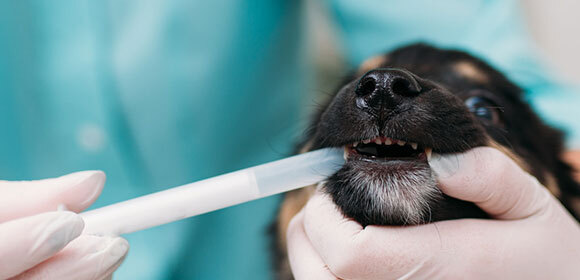Dog Deworming – What You Need to Consider When Giving Treatments
07.10.2022 - Reading time: 4 minutes

Wherever dogs play and sniff, one way or another they will come into contact with worms or their eggs. Different strategies can be used to prevent the development of parasites and dangerous diseases. Here you can find out ways of combating worms and what you need to bear in mind when administering worming treatments.
General information on worms and worming
When dogs are allowed to live in a natural way and run free, they will inevitably come into contact with worms. This cannot be avoided and is a natural process.
Dogs are exposed to the excrement of other dogs and animals every day – by playing in the fields, out walking, hunting in the forest, sniffing and licking plants, carrion and excrement. So it is inevitable that they will ingest worm eggs through their nose and mouth at some time or other.
But these worm parasites are not only dangerous for our four-legged friends, they can also be transferred to our hands – for example when petting our dog – and then into our organisms. They can infest internal organs, which may lead to serious illnesses. For more information on diseases passed between dogs and humans, read the Zoonotic Diseases Health guide on Maxi Zoo.
Symptoms of worm infestation generally appear at a very late stage in dogs. These include diarrhoea, loss of appetite or a change in appetite, possibly emaciation and itching at the anus (“scooting”). In the advanced stage, vomiting as well as skin and fur changes may occur.
Vets and animal health advisors recommend regular worm treatments for dogs to ensure that canine roundworms and the fox tapeworm do not stand a chance.
How often should a dog be wormed?
This question has been extensively debated by dog owners, veterinary surgeons and experts. However, one aspect is undisputed: in the case of an acute worm infestation, you should definitely give your dog a worm treatment. Afterwards, it is important to rebuild the dog’s intestinal flora. Most vets recommend worming “as prophylaxis” every three to four months. But what about worming as a preventive measure?
What happens during “anthelmintic therapy”?
Nowadays, worm treatments are not as stressful for the dog’s body as they were some years ago. Most dogs do not show any side effects visible to humans. Nevertheless, as with all medical preparations, side effects such as diarrhoea or lethargy can occur. Very rarely, neurological deficits may occur in dogs, especially in cases of severe worm infestation/worm death.
There are many different worming preparations from different manufacturers and with different modes of action. Their function is to kill the parasites in the dog’s intestine. Active ingredients such as Milbemycin oxime and praziquantel (for example in Milbemax®) are commonly used. Milbemycin oxime is effective against mites and threadworms, while praziquantel is used to treat sucking worms and tapeworms. Both preparations paralyse or cramp the muscles of the parasites, whereby they are killed and quickly excreted.
Your dog’s intestinal flora will inevitably be affected with each dose of worming medication. The long-term health effects of a worming treatment administered regularly over decades can only be determined once the pharmaceutical industry has carried out some long-term studies.
24 hours after completing the worming treatment, your dog can immediately become infected with worms again. There are currently no vaccines against worms and mites.

The alternative way: regular faecal examinations
For those who wish to spare their dog a lifetime of medication, there is an effective means of checking for actual parasite infestation: faecal analysis.
Examining the faeces is a good alternative to administering worming treatments in suspected cases, especially in the case of allergic, sick, old or generally weakened dogs.
Follow the procedure below:
- Collect three faecal samples on three consecutive days, as worms/worm eggs may not be excreted in all of your dog’s faeces.
- These should be submitted to a veterinary laboratory or your vet, where they can be examined for parasite infestation.
- In the case of a proven worm infestation, an anthelmintic therapy is inevitable.
- Have the faecal analysis carried out regularly every three months or so to ensure your dog is worm free.
Worming your dog: costs of anthelmintic therapy and faecal examinations
- The number of tablets needed depends on the preparation, the actual worm infestation and the body weight of your dog.
- A faecal analysis has the advantage of avoiding medicinal stress on the dog’s organism.


